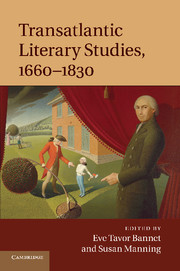Book contents
- Frontmatter
- Contents
- Notes on contributors
- Acknowledgements
- Introduction: British and American genres
- Chapter 1 Transatlantic books and literary culture
- Chapter 2 Transatlantic utopianism and the writing of America
- Chapter 3 Tales of wonder, spiritual autobiographies, and providence tales
- Chapter 4 Life writings
- Chapter 5 Benjamin Franklin and transatlantic literary journalism
- Chapter 6 Theatre, drama, performance
- Chapter 7 Transatlantic American Indians
- Chapter 8 Literature of the ocean
- Chapter 9 “To gird this watery globe”
- Chapter 10 Ghostly and vernacular presences in the black Atlantic
- Chapter 11 Susanna Rowson and the transatlantic captivity narrative
- Chapter 12 Domestic fiction and the reprint trade
- Chapter 13 Transatlantic Gothic
- Chapter 14 Transatlantic Romanticisms
- Chapter 15 Journeys of the imagination in Wheatley and Coleridge
- Chapter 16 Transatlantic historical fiction
- Further reading
- Index
- References
Chapter 16 - Transatlantic historical fiction
Published online by Cambridge University Press: 05 January 2012
- Frontmatter
- Contents
- Notes on contributors
- Acknowledgements
- Introduction: British and American genres
- Chapter 1 Transatlantic books and literary culture
- Chapter 2 Transatlantic utopianism and the writing of America
- Chapter 3 Tales of wonder, spiritual autobiographies, and providence tales
- Chapter 4 Life writings
- Chapter 5 Benjamin Franklin and transatlantic literary journalism
- Chapter 6 Theatre, drama, performance
- Chapter 7 Transatlantic American Indians
- Chapter 8 Literature of the ocean
- Chapter 9 “To gird this watery globe”
- Chapter 10 Ghostly and vernacular presences in the black Atlantic
- Chapter 11 Susanna Rowson and the transatlantic captivity narrative
- Chapter 12 Domestic fiction and the reprint trade
- Chapter 13 Transatlantic Gothic
- Chapter 14 Transatlantic Romanticisms
- Chapter 15 Journeys of the imagination in Wheatley and Coleridge
- Chapter 16 Transatlantic historical fiction
- Further reading
- Index
- References
Summary
I begin with the second of two chronological book-ends. In 1833, Rufus Choate delivered an address in Salem, Massachusetts advocating “The Importance of Illustrating New-England History by a Series of Romances like the Waverley Novels.” Fiction commemorating events and scenery in colonial history prior to 1783 would be valuable “as helps to history, as contributions to history, as real and authoritative documents of history,” to embody and
fix deep in the mind and memory of the whole people a vast amount of positive information quite as authentic and valuable and curious as that which makes up the matter of professed history, but which the mere historian does not and cannot furnish. They would thus be not substitutes for history, but supplements to it.
Choate singled out “the Puritan character” as particularly worth the attention of an American Waverley romancer. At the same moment, just down the road in Salem, Nathaniel Hawthorne was publishing his first historical stories. “Provincial Tales” and “Seven Tales of my Native Land” appeared individually in The Token, Salem Gazette, and Atlantic Souvenir. Dazzled by the contemporary colossus of Walter Scott, Choate was unable to see that alternative models for transatlantic historical fiction already existed, and that they encompassed a geographical imagination much broader than New England.
Back in the 1680s an immigrant from the Netherlands settled in Albany County and anglicized his name to Knickerbacker. A century later one of his descendants was named after George Washington; as a young writer he adopted his ancestor's persona in A History of New York from the Beginning of the World to the End of the Dutch Dynasty (1809). The stylistic antecedents of Washington Irving's irascible Dutch antiquarian Diedrich Knickerbocker were Jonathan Swift and Laurence Sterne, melded into a unique blend of whimsy and satire, political barbs tempered by indulgent digression. This voice bespoke a whole attitude to the past in a land dedicated to the future. Knickerbocker's annunciation of absence figured his country's lack of antiquity (“Left his lodgings sometime since, and has not since been heard of, a small elderly gentleman…”); his abandoned manuscript was America's first transatlantic fictional history. The pedantic persona glances back at Puritan historian Cotton Mather's Magnalia Christi Americana (1702), which inscribed New England's providential progress through the biographies of its governors and clergy. Knickerbocker's History is similarly patriotic, but with an explosive edge of skepticism about its own enterprise: a spoof founding narrative that established “history” as a subset of fiction in American comic writing. Irving's penchant for bilingual puns compounds Rabelaisian bawdry and seventeenth-century Dutch colonial ways with nineteenth-century American progressivism. Knickerbocker's epic ambitions for his history culminate in a mock-Gibbonian penultimate chapter “Containing reflections on the decline and fall of empires, with the final extinction of the Dutch Dynasty,” in which the historian's melodramatic valediction precipitates global chaos:
the chain of effects stopped not here; the successful revolution in America produced the sanguinary revolution in France, which produced the puissant Buonaparte who produced the French Despotism, which has thrown the whole world in confusion! – Thus…have all the present convulsions, revolutions and disasters that overwhelm mankind, originated in the capture of little Fort Casimir, as recorded in this eventful history.
A piece of provincial hubris and authorial self-inflation, this is pure comedy. The subsequent sentence, though, sounds a patriotic warning familiar in American writing in the first decade of the nineteenth century (a decade that culminated in a second outright Anglo-American war): “Let then the potentates of Europe, beware how they meddle with our beloved country.”
- Type
- Chapter
- Information
- Transatlantic Literary Studies, 1660–1830 , pp. 254 - 270Publisher: Cambridge University PressPrint publication year: 2011



